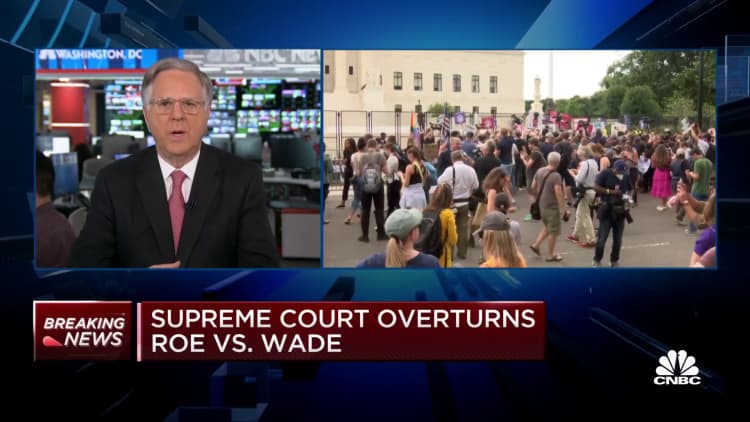WASHINGTON (AP) — The Supreme Court said Monday it will take up a new redistricting case involving Louisiana’s congressional map with two mostly Black districts.
The court won’t hear arguments until early next year and the 2024 elections are proceeding under the challenged map, which could boost Democrats’ chances of retaking the closely divided House of Representatives.
A lower court had invalidated the map, but the justices allowed it to be used in 2024 after an emergency appeal from the state and civil rights groups.
The issue in front of the justices is whether the state relied too heavily on race in drawing a second majority Black district.
The court’s order Monday is the latest step in federal court battles over Louisiana congressional districts that have lasted more than two years. Louisiana has had two congressional maps blocked by lower courts and the Supreme Court has intervened twice.
The state’s Republican-dominated legislature drew a new congressional map in 2022 to account for population shifts reflected in the 2020 Census. But the changes effectively maintained the status quo of five Republican-leaning majority white districts and one Democratic-leaning majority Black district in a state that is about one-third Black.
Noting the size of the state’s Black population, civil rights advocates challenged the map in a Baton Rouge-based federal court and won a ruling from U.S. District Judge Shelly Dick that the districts likely discriminated against Black voters.
The Supreme Court put Dick’s ruling on hold while it took up a similar case from Alabama. The justices allowed both states to use the maps in the 2022 elections even though both had been ruled likely discriminatory by federal judges.
The high court eventually affirmed the ruling from Alabama, which led to a new map and a second district that could elect a Black lawmaker. The justices returned the Louisiana case to federal court, with the expectation that new maps would be in place for the 2024 elections.
The 5th U.S. Circuit Court of Appeals gave lawmakers in Louisiana a deadline of early 2024 to draw a new map or face the possibility of a court-imposed map.
Gov. Jeff Landry, a Republican, had defended Louisiana’s congressional map as the state’s attorney general. Now, though, he urged lawmakers to pass a new map with another majority Black district at a special session in January. He backed a map that created a new majority Black district stretching across the state, linking parts of the Shreveport, Alexandria, Lafayette and Baton Rouge areas.
A different set of plaintiffs, a group of self-described non-African Americans, filed suit in western Louisiana, claiming that the new map was also illegal because it was driven too much by race, in violation of the Constitution. A divided panel of federal judges ruled 2-1 in April in their favor and blocked use of the new map.
The Supreme Court voted 6-3 to put that ruling on hold and allow the map to be used.
State Attorney General Liz Murrill, whose office has defended both maps enacted by lawmakers, called on the court to “provide more clear guidance to legislators and reduce judicial second-guessing after the Legislature does its job. Based upon the Supreme Court’s most recent pronouncements, we believe the map is constitutional.”
The state and civil rights groups were at odds over the first map, but are allies now.
“Federal law requires Louisiana to have a fair map that reflects the power and voice of the state’s Black communities,” Stuart Naifeh of the NAACP Legal Defense and Education Fund said in a statement. “The state recognized as much when it adopted a new map with a second majority-Black district in January. Now the Supreme Court must do the same.”
The Supreme Court vote to use the challenged map in this year’s elections was unusual in that the dissenting votes came from the three liberal justices, who have been supportive of Black voters in redistricting cases. But, in an opinion by Justice Ketanji Brown Jackson, they said their votes were motivated by their view that there was time for a new map to be drawn, and their disagreement with past court orders that cited the approach of an election to block lower-court rulings.
“There is little risk of voter confusion from a new map being imposed this far out from the November election,” Jackson wrote in May.
In adopting the districts that are being used this year, Landry and his allies said the driving factor was politics, not race. The congressional map provides politically safe districts for House Speaker Mike Johnson and Majority Leader Steve Scalise, fellow Republicans. Some lawmakers have also noted that the one Republican whose district was greatly altered in the new map, Rep. Garret Graves, supported a GOP opponent of Landry in last fall’s governor’s race. Graves chose not to seek reelection under the new map.
Among the candidates in the new district is Democratic state Sen. Cleo Fields, a former congressman who is Black.
___
Associated Press writer Sara Cline contributed to this report from Baton Rouge.




